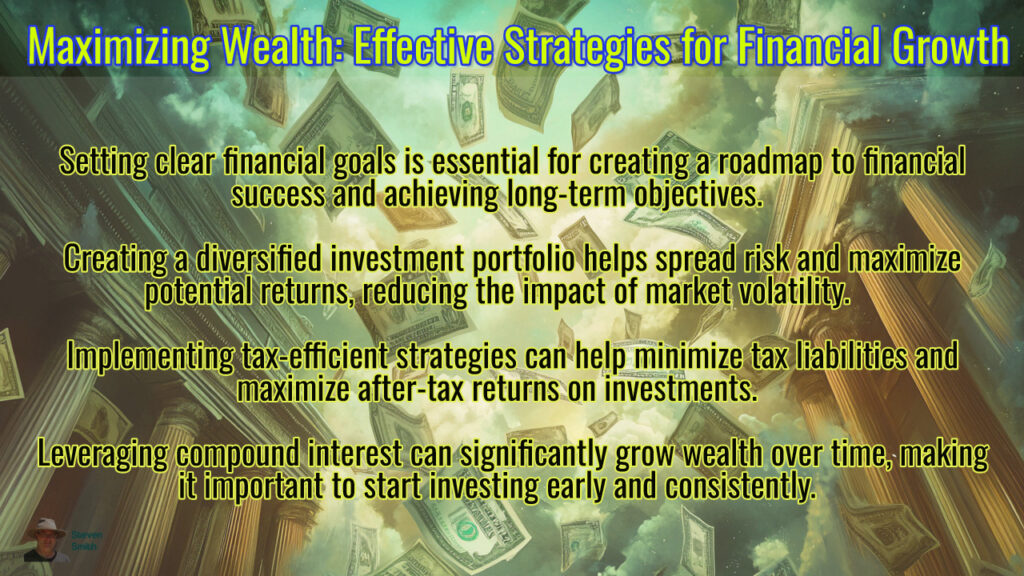In order to succeed financially, one must set clear financial goals. Establishing clear, quantifiable goals for different facets of one's financial life, like business endeavors, home ownership, and retirement savings, is part of this process. Financial objectives can be effectively created by applying the SMART criteria (Specific, Measurable, Achievable, Relevant, and Time-bound).
Key Takeaways
- Setting clear financial goals is essential for creating a roadmap to financial success and achieving long-term objectives.
- Creating a diversified investment portfolio helps spread risk and maximize potential returns, reducing the impact of market volatility.
- Implementing tax-efficient strategies can help minimize tax liabilities and maximize after-tax returns on investments.
- Leveraging compound interest can significantly grow wealth over time, making it important to start investing early and consistently.
- Minimizing debt and managing expenses is crucial for maintaining financial stability and freeing up resources for investment and savings.
- Protecting assets with insurance safeguards against unexpected events and liabilities, providing financial security and peace of mind.
- Seeking professional financial advice can provide valuable insights and expertise to optimize financial strategies and achieve financial goals.
A SMART goal would be, for example, "saving $500,000 for retirement by age 65," as opposed to a general objective like "saving money for retirement.". ".". Setting financial goals in order of importance according to timeliness and personal values is also essential. With this method, people can set realistic goals for their financial goals and match them with their life goals, as well as a realistic timeline for when they will be accomplished. For instance, if traveling abroad is very important to you, you might put more money aside to save for a five-year global trip. People can create a thorough financial roadmap by clearly defining their financial objectives and setting priorities for them.
In addition to helping to keep the focus on long-term financial goals, this strategy makes it possible to allocate resources with more excellent knowledge. Diversification Requires Proper Asset Allocation. Asset allocation, which is choosing the appropriate combination of assets based on your time horizon, investment goals, and risk tolerance, is one technique for building a diversified investment portfolio. For instance, you might allocate a more significant percentage of your portfolio to stocks if you have a longer time horizon and can tolerate higher risk.
However, if you have a shorter time horizon and are averse to taking on more risk, you might allocate more to bonds and cash. Consistent Rebalancing: Preserving Your Desired Allocation. Routinely rebalancing your holdings can also help you maintain the asset allocation you have chosen for your portfolio.
Strategy Key Metrics
Investing Return on Investment (ROI), Portfolio Diversification
Saving Emergency Fund, Savings Rate
Debt Management Debt-to-Income Ratio, Credit Score
Income Generation Passive Income, Multiple Income Streams
To return your portfolio to its target allocation, you must sell assets that have performed well and purchase underperformed assets. Advantages of Having a Wide Range of Investments. By building a diversified investment portfolio and routinely rebalancing it, you may be able to lower risk and increase returns over time. This strategy can assist you in navigating market swings and accomplishing your long-term financial objectives.
You can maximize your wealth after taxes and reduce the effect of taxes on your investment returns by putting tax-efficient strategies into practice. One tax-efficient tactic is utilizing tax-advantaged accounts, such as 401(k)s, IRAs, & 529 college savings plans. You may be able to grow your investments more quickly with these accounts than with taxable ones because they provide tax advantages like tax-deferred growth or tax-free withdrawals. Thinking about the tax consequences of various investment vehicles is another tax-efficient tactic.
Investing in these products may be more tax-efficient because actively managed mutual funds have higher turnover and capital gains distributions than index funds or exchange-traded funds (ETFs). Also, municipal bonds may offer tax-free income depending on your state and federal jurisdiction. Put tax-loss harvesting into practice to offset capital gains and lower your tax liability. This entails taking profits from investments that have underperformed and applying those profits to investments that have gained. It may be possible for you to keep a more significant portion of your investment returns & more accomplish your financial objectives by employing tax-efficient strategies. A great strategy to increase wealth over time is to use compound interest.
Compound interest promotes exponential growth by allowing you to earn interest on both your initial investment and any additional interest that has been added. Investing early and consistently is an excellent method to use compound interest. By doing this, you can benefit from compounding's power over an extended period. You can further take advantage of compound interest by reinvesting your investment earnings rather than taking them out of cash. As a result, your profits can compound further and generate even more earnings.
If you invest in mutual funds or stocks that pay dividends, you can reinvest the dividends to purchase additional shares, which will increase future dividends. Also, taking advantage of compound interest calls for patience & long-term investment. The impact on your wealth that compound interest can have increases with time. You can achieve significant growth in your investment portfolio by utilizing compound interest through early investing, reinvesting earnings, and maintaining long-term investments. The key to obtaining financial stability & accumulating wealth is controlling spending & minimizing debt.
Setting aside money for high-interest debt repayment, like credit card debt or personal loans, is one strategy to reduce debt. You can save money on interest payments and free up cash flow for other financial objectives by paying off high-interest debt first. Maintaining a budget & cutting back on wasteful spending are two more ways to reduce debt. You can track your income and expenses & find areas where you can make savings by creating a budget. For instance, you might think about cutting back on entertainment or eating out to free up more money for savings or debt repayment.
Moreover, controlling expenses entails knowing your spending patterns and choosing wisely where to allocate your funds. This could involve haggling over prices, looking for cheaper insurance or utility quotes, or figuring out ways to cut costs on regular purchases. Reducing debt and controlling spending wisely can make it possible to attain your financial objectives and invest in your future.
All People Must Have Health Insurance. Health insurance is one kind of insurance that most people consider to be essential. It ensures that you receive the required medical care without worrying about paying for it by helping cover medical expenses and guarding against high healthcare costs.
You are securing the Future for Your Loved Ones with Life and Disability Insurance. By replacing lost income, paying off debts, or covering funeral costs, life insurance gives your loved one financial security in the event of your passing. Disability insurance also replaces your income if an illness or injury prevents you from working, protecting your family's economic stability. Insurance for Property and Liability: Guarding Your Assets Against Loss or Damage. Your assets are shielded against harm or loss from natural disasters and accidents by property and casualty insurance, which includes homeowners' and auto insurance.
You can lessen the financial effects of unanticipated events and ensure that your hard-earned wealth is safeguarded for the future by investing in these kinds of insurance. Getting expert financial advice can offer you the knowledge and direction you need to make wise financial decisions. You can develop a thorough financial plan customized to your unique objectives and situation with the aid of a financial advisor. They can offer customized advice on estate planning, tax optimization, investment strategies, retirement planning, and other topics.
Access to expert money management services is an additional advantage to getting professional financial advice. A financial advisor can assist you in making the right investment choices, given your time horizon and risk tolerance. They can also monitor your portfolio to ensure it stays in line with your financial objectives.
To assist you in navigating shifting market conditions and life events, they can also offer your ongoing guidance and support. Having a reliable financial expert who can guide you toward wise financial decisions and getting professional advice can also give you peace of mind. A financial advisor is a fiduciary, acting in your best interests by providing unbiased advice. You can improve your confidence in your financial judgments & strive toward long-term financial success by getting expert financial advice.
In summary, the following are critical elements of a successful financial plan: defining precise financial objectives, building a diverse investment portfolio, implementing tax-efficient strategies, utilizing compound interest, reducing debt and controlling spending, insuring assets, and seeking professional financial advice. By implementing these strategies into your financial journey, you can create a strong foundation for accomplishing your long-term financial objectives and safeguarding your financial future.
To learn more about wealth creation strategies, you may want to check out my article on gaining an unfair advantage in the affiliate game with Advertsuite. In this article, I critically appraises using Advertsuite to maximize your affiliate marketing efforts and increase your wealth.
Thanks for reading
Steven Smith


